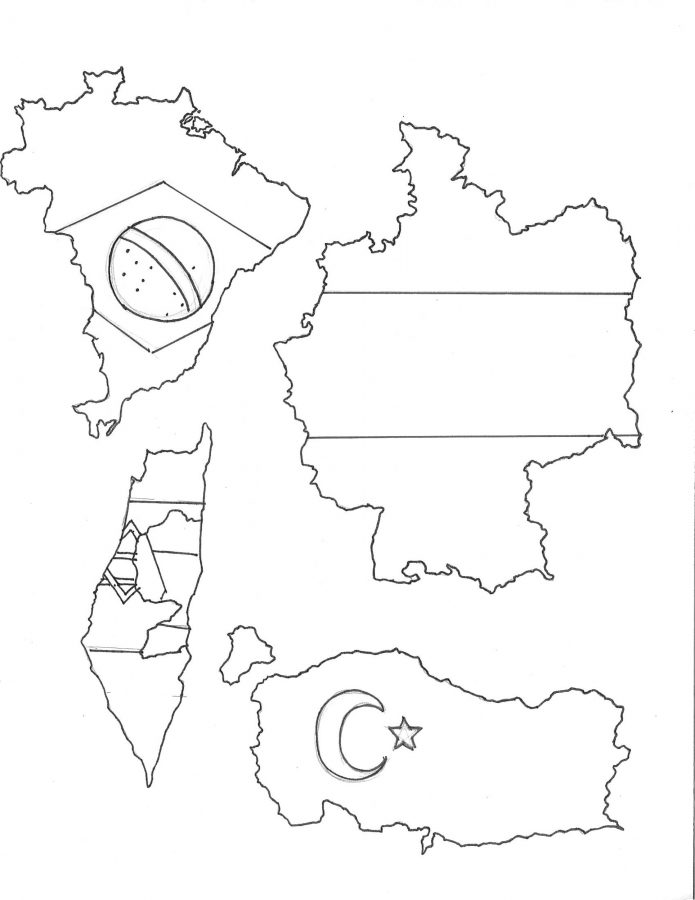Exploring politics around the world
Current political situations in Turkey, Israel, Germany, Brazil, and the Philippines spark tensions between political parties
Credit: Lei Anne Rabeje
February 10, 2017
Israel: Inside the Israeli-Palestine conflict
President Trump vowed several days after his inauguration to move the U.S. Embassy in Israel from Tel Aviv to Jerusalem. His pro-Israel position comes several days after the Paris summit discussing the Israeli-Palestinian conflict. The Paris summit was held on January 15 to discuss peace between Israel and Palestinians, yet neither state was invited to participate in the day-long meeting. According to BBC World News, a Foreign Office statement claimed “‘particular reservations’ about a conference ‘intended to advance peace between the parties that does involve them.’” The summit sought to enforce the two-state solution, which asserts each state’s boundaries, the annexation of Jerusalem by one state, flow of refugees, and foreign military occupation. It concluded restating their commitment to the two-state solution, garnering support from Palestine and accusations of its unfairness from Israel. Following the summit, pro-Israel POTUS Donald Trump proposes his intention to move Israeli U.S. embassy from Tel Aviv to Jerusalem, which aligns the United States with Israel in the division of land between the states.
Germany: Rising Popularity of German right-wing populist party
The anti-immigration party (AfD) recently won 14% of the Berlin vote in recent elections, an unprecedented high. On the other hand, the previously dominant Christian Democratic Union, the party of Chancellor Merkel, won only 17.5% of the vote. The AfD is an openly Islamophobic party whose rise to power arrived as a result of some discontent with Merkel’s open door immigration policy for refugees. Initially, in response to civilian deaths in the Aegean Sea, most Germans supported her policy, but it has since gained some dissent as right wing advocates blame recent terror attacks in Germany on the influx of Syrian refugees. Some in the EU worry that this rise of right wing populism in Germany may reflect Trump’s election in the U.S., and threaten Germany’s strength within the Union. With elections for the Chancellor coming in September, if Merkel is usurped in her attempt for a fourth term, political turmoil could upset German and EU markets. The AfD has many qualms with the EU in its open border agreements, and their assent to power could see downturn in economic growth in Germany, as well as Western Europe as a whole.
Turkey: Take a look inside the failed coup attempt
Turkey underwent a failed coup attempt against President Erdogan in July 2016. Erdogan blamed the seizure of certain regions of the cities of Ankara and Istanbul on Fethullah Gülen, an Islamist businessman living in Pennsylvania, deeming it an effect of the corrosion of secularism in the country. Public opinion was mostly against the coup d’état attempt, with the populace informed to prevent progress of defecting forces, which were ultimately defeated. In response to the insurrection, Erdogan arrested 40,000 officials accused of connections to the coup against the executive-in-chief, and dismissed more than 100,000 soldiers from military service. However, more concerning are the possible amendments to the Turkish constitution. Erdogan, who already has a reputation of restricting freedom of speech, would be given centralized power to directly appoint Parliamentary members of his own party, and direct control over the judiciary branch. The instability has already affected the Turkish market, with the lira becoming the worst performing currency this year, despite Erdogan’s attempts to lower bank interest rates to compensate. The increased violence and endangerment of representative government could also lead to a reduction in Turkey’s vital tourist economy.
Philippines: Suspending the extrajudicial mass killings
Police Chief Ronald dela Rosa announced the suspension of President Duterte’s controversial war on drugs on January 30 following the murder of a South Korean businessman. According to BBC News, more than 7,000 people have been killed since Duterte’s war on drugs began last June, which has mostly targeted impoverished communities. The hardline stance against drugs and use of extrajudicial groups has garnered harsh criticism from human rights groups, yet Duterte continues to have popular support amongst Filipinos. CNN World News reporter Pamela Boykoff interviewed several persons from Duterte’s home county, Davao, Mindanao, where he served as mayor for 15 years. Anton Uy, a 16-year-old engineering student praises Duterte as “courageous” and “determined” in the interview, saying, “He never gives up. He always knows what the right thing to do is for the Philippines.” Uy’s sentiment towards Duterte staunch position is reminiscent of that of many Filipinos, with an approval rate of 80 percent, according to Independent.co.uk, despite promotion of mass killing.
Brazil: Rising economic instability with Temer
Brazil’s economic crisis continues months after ex-President Dilma Rousseff’s impeachment and removal from office due to a corruption scandal involving Petrobras, one of the country’s most important companies. According to Forbes, Petrobras’ stock market crashed 80% following Rousseff’s removal from office on September 1, 2016, resulting in increased unemployment across Brazil. A recent survey claims that unemployment rose from 4.5% in 2010 to 12% in 2017. Rousseff’s removal comes after a 14-year long rule of Rousseff’s Workers’ Party, one of the largest left-wing movements of Latin America. The past 14 years was marked with an exponential poverty decrease as the percentage of poverty was halved and now lies at 21.4%. Yet following Rousseff’s suspension on June 2016, unemployment reportedly shot up 20% from 2015 with nearly 11.4 million unemployed Brazilians. Michel Temer, Rousseff’s running mate, now serves as the President of Brazil, but the future looks grim following accusations of Temer soliciting millions in illegal donations.

